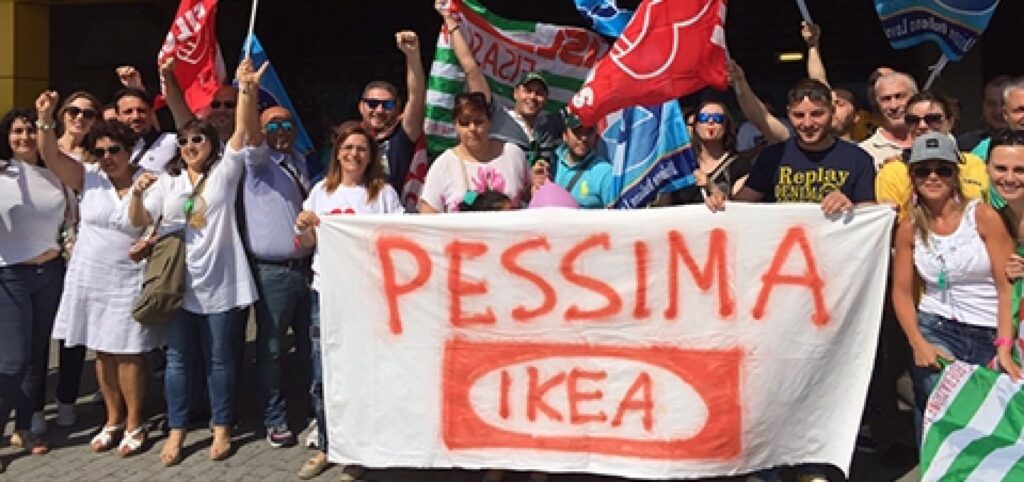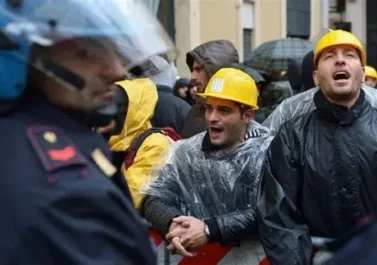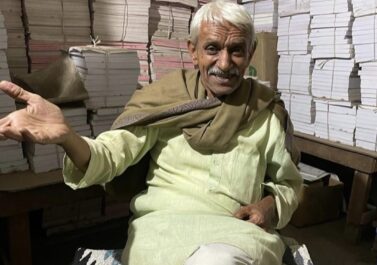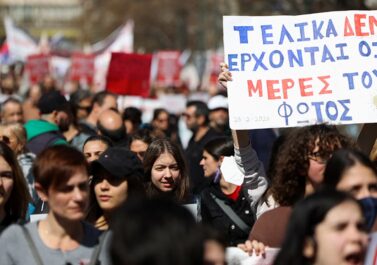
This is a heavily abridged version of a text from Collegamenti – numero 1, April 2021. We translated it from the German magazine Wildcat.
Nichelino is located in the south of Turin and used to be the site of the Viberti vehicle and trailer factory amongst others. After the closure of this and other factories, millions in public funds were poured into converting the industrial site. In the last 20 years, a center of logistics in all its shades has emerged here. Three years ago, AF Logistic, which works for IKEA, moved a large part of its operations here from Trofarello in northern Turin. AF Logistics organizes the transport and assembly of IKEA furniture throughout Piedmont and the supply of Carrefour supermarkets. In doing so, they award contracts to a whole chain of subcontractors, most of which are organized in the form of ‘cooperatives.’ Working conditions and pay vary widely. The grassroots union CUB [Confederazione Unitaria di Base] has successfully supported the workers of two such cooperatives in their struggles.
[…]
The backstory of our exceptionally militant March began in late 2020, when a relatively large group of workers from the Diana cooperative approached CUB Trasporti in Turin about wage disagreements. The problem was resolved by the union, and the cooperative paid the workers the back wages they were owed, as well as the incorrectly calculated child benefits. This group of workers had previously been organized in the CGIL [Confederazione Generale Italiana del Lavoro – Italian General Confederation of Labour] union FILT [Federazione Italiana Lavoratori Trasporti – Italian Federation of Transport Workers], which had not met their expectations. As so often, they had had a labor dispute with this social partnership union, but after an (objectively modest?) agreement had been reached, it had no longer been interested in their day-to-day problems.
Two absolutely important issues were at stake: the workers told us that AF’s local manager spends his time belittling subcontracted workers in a bullying and provocative manner instead of doing his job and solving the day-to-day problems of scheduling customer orders. Secondly, the workload has increased at a dizzying rate, and the often poor organization increases the workload. The transport teams (each consisting of two workers) are saddled with too many deliveries. In addition, the assembly of complicated furniture is often time-consuming, the clients live in far-flung locations, and the basic working conditions at the client’s site are very often not met – from a minimum temperature in the houses to safety standards at construction sites. The assembly time calculated by the client and the number of assemblies allocated for one working day often do not match.
The first phase was about joining forces and negotiating changes in work organization with the cooperative. It very quickly became clear that we had to involve AF Logistics directly in the negotiations. After all, those responsible for the work organization are not based in Turin and do not belong to the cooperative. The latter can certainly counter the mistakes and errors made at headquarters, but when orders are notified only a few hours in advance, they have little chance of avoiding working days of more than ten hours. AF was called in, but initially refused to meet the workers’ demand that headquarters give 48 hours’ notice of the order, including delivery instructions. This goal became one of the main points of protest in the Nichelino warehouses.
Meanwhile, the front in the spectrum of cooperatives operating in Turin had expanded. Workers of – let’s call them improvised and entry-level cooperatives – joined the union. They had much more devastating working conditions: grueling shifts, day laborer pay, no paid sick leave, vacation and overtime, all sorts of harassment that culminated in having to pay for parking tickets and any damage to delivery trucks while working themselves. An unbelievable scenario that makes it clear that feudal conditions are a reality in modern capitalism. The cooperatives that organize the work in this way are assigned the less important work and they usually get less money from the main ones; the central office saves money and accepts less customer satisfaction in return.
In this way, the real principal, IKEA, can save money for a service it provides below cost with the goal of customer retention. The important orders are given to better paid expert workers, the less important ones go to fraudsters who employ people without caring about their qualifications and who pay them ridiculous wages – if any! Similar to the classic model of caporalato [a gang-master system] in the agricultural sector in the South.
In the course of three months we have set up a real trade union intervention, and have been able to count on a large number of members, an active group with clearly defined objectives, and a high capacity to put pressure on the opponent. The latter is guaranteed by the structure of this type of activity, in this industry what matters is the speed and flexibility with which the companies can respond to the customer. If the speed of response to the customer’s request is the strength of the enterprise, then the ability to slow down or even block the flow of work is the strength that workers can use to their benefit. A kind of worker-use of the terms of delivery.
This explains why the other side quickly engaged in negotiations and didn’t put up any obstacles – not only the cooperatives, whose fragility is already given by the fact that they are substantially a tool in the hands of the clients, but also AF itself, the subcontractor of IKEA and client of the cooperatives. The negotiations then weren’t easy and dragged on quite a bit, also because the period from December to February was historically the most difficult for these companies: demand far exceeded the rest of the year. This is the traditional time for gifts: 13th month salary, Christmas bonus… moreover, in the second Corona wave, the stores were closed and online trade took off strongly, and with it, the demand for transport and assembly activities – while at the same time, many cooperative workers themselves wanted to take vacation.
[…]
It was business as usual: weeks of negotiations brought no fundamental change. There were many discussions and the IKEA assemblers were promised changes, but the problems workers suffered the most from weren’t solved. Therefore, it was decided to take the reins with a one-day strike on March 26. We managed to keep this information secret for almost a week. It was only at the very end that it leaked out and led to an acceleration of events. AF’s management moved and put pressure on the head of the two cooperatives, Cavalieri and El Habiba, which were the most obvious reasons for the dispute. But it was too late. The motivations that had led to the decision to stop work worked deep in the souls of almost everyone, and the will to strike was greater than the fear of the possible consequences. Above all, there was a lack of confidence in the good will of the other side.
On the morning of March 26, the strike picket was in force: out of 80 workers at the logistics hub, only eight went in to start work – amid the whistles and taunts of their striking colleagues. Within an hour, a confused negotiation began with the bosses of both AF and the cooperatives, who immediately rushed to the gate. The demands were clear and the strike worked. The following Monday, an agreement was signed at the union office, providing for the immediate regulation of labor contracts, specifically: payment of overtime, holidays and sick days in accordance with the collective agreement. Work orders had to be communicated to the assembly teams 48 hours in advance. The agreement was signed by the union and the various cooperatives to end the legal dispute.
It was a victory all along the line, although the desired removal of AF’s boss from the Nichelino site did not succeed. Instead, he was provisionally placed under the authority of a member of the head office management to control his behavior.
The positive outcome was that the strike was successful and that the would-be boss of El Habiba and Cavalieri had enormous difficulties in keeping his own people in line with blackmail, threats and promises that everything would be better in the future. But there is also the strategic importance of the work these people are doing. One day of work stoppage means a loss of about 140,000 euros for AF – a loss that cascades down to all the cooperatives that work for AF. The success built on the fragility of an entire industry that cannot afford to stop the continuous flow of goods because of the severe impact on its own profits. The success has broken the distrust and resignation of the workers, but we know that the difficulties are not over and in many ways are just beginning. However, we are sure that the victory will give a positive boost to anchoring in this industry.



